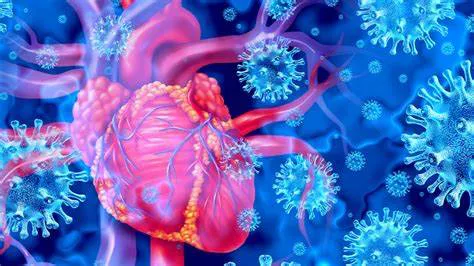The COVID-19 pandemic has brought unprecedented challenges to global health systems and economies. The rapid development and deployment of vaccines have been a crucial part of the strategy to combat the virus. However, with the rollout of vaccines, concerns and questions have arisen regarding their safety, particularly regarding potential side effects such as heart inflammation. This article delves into the topic of whether the new coronavirus vaccine can cause heart inflammation, exploring the scientific evidence, mechanisms, and implications for public health.
Understanding Heart Inflammation
Heart inflammation, medically known as myocarditis and pericarditis, involves inflammation of the heart muscle (myocardium) and the outer lining of the heart (pericardium), respectively. These conditions can cause symptoms such as chest pain, shortness of breath, and palpitations. Severe cases may lead to heart failure, arrhythmias, or even sudden death.
Myocarditis is most commonly triggered by viral infections, but it can also be caused by bacterial infections, autoimmune diseases, and exposure to certain toxins.
COVID-19 And Heart Inflammation
COVID-19 itself has been associated with various cardiovascular complications, including myocarditis. Studies have shown that the SARS-CoV-2 virus can directly infect heart cells, leading to inflammation and damage. This association underscores the importance of vaccination in preventing severe outcomes from COVID-19, which includes potential heart damage caused by the virus.
Vaccines And Immune Response
Vaccines work by stimulating the immune system to recognize and fight off pathogens. The mRNA vaccines (Pfizer-BioNTech and Moderna) and viral vector vaccines (Johnson & Johnson) have been effective in preventing COVID-19.
However, any activation of the immune system carries a risk of adverse reactions, including inflammation.
Reports of Heart Inflammation Post-Vaccination
Since the introduction of COVID-19 vaccines, there have been reports of myocarditis and pericarditis following vaccination, particularly among younger males and after the second dose of mRNA vaccines. Regulatory agencies like the Centers for Disease Control and Prevention (CDC) and the European Medicines Agency (EMA) have investigated these reports to determine if there is a causal link.
Evidence from Clinical Trials And Real-World Data
Initial clinical trials of COVID-19 vaccines did not show a significant increase in heart inflammation cases. However, real-world data collection is ongoing. Studies have suggested that while there is a slightly increased risk of myocarditis and pericarditis following mRNA vaccination, these cases are typically mild and resolve quickly with appropriate treatment.
For instance, a study published in the New England Journal of Medicine (NEJM) analyzed data from Israel, which has a high vaccination rate. The researchers found a small increase in myocarditis incidence among vaccinated individuals, primarily in males aged 16 to 30 years. However, the benefits of vaccination in preventing severe COVID-19 far outweighed this risk.
Mechanisms of Vaccine-Induced Myocarditis
The exact mechanisms by which COVID-19 vaccines might cause myocarditis are not fully understood. However, some hypotheses include:
Molecular Mimicry: The immune system might mistake heart proteins for viral proteins, leading to an autoimmune response.
Direct mRNA Influence: The mRNA in vaccines might, in rare cases, trigger an inflammatory response.
Adjuvant Reaction: Components used to boost the immune response might cause inflammation in susceptible individuals.
Balancing Risks And Benefits
It is crucial to balance the small risk of myocarditis from vaccination against the significant risk of severe illness from COVID-19. Vaccines reduce the risk of hospitalization, severe disease, and death.
Additionally, COVID-19 can cause myocarditis more frequently and severely than vaccines.
Recommendations From Health Authorities
Health authorities, including the CDC, recommend vaccination for all eligible individuals, emphasizing that the benefits outweigh the risks.
They also continue to monitor vaccine safety and update guidelines based on new evidence. For individuals who experience myocarditis or pericarditis post-vaccination, the CDC advises seeking medical attention and refraining from strenuous activity until recovery.
Addressing Public Concerns
Public concern about vaccine safety is understandable. Transparent communication from health authorities is vital in addressing these concerns. Providing clear information about the risks and benefits of vaccination helps individuals make informed decisions.
Ongoing Research And Monitoring
Research into the safety of COVID-19 vaccines is ongoing. Long-term studies and surveillance systems, such as the Vaccine Adverse Event Reporting System (VAERS) and the Vaccine Safety Datalink (VSD), play a crucial role in detecting and analyzing potential side effects.
Conclusion
In summary, while there have been reports of heart inflammation following COVID-19 vaccination, these cases are rare and generally mild. The benefits of vaccination in preventing severe COVID-19 far outweigh the small risk of myocarditis or pericarditis. Ongoing research and vigilant monitoring will continue to ensure the safety of vaccines. Public health messages should focus on the overall safety and efficacy of vaccines in protecting against COVID-19 and its complications.
In light of the evidence, it is clear that vaccination remains a critical tool in ending the pandemic and protecting public health. Individuals with concerns about vaccine side effects should consult healthcare providers to discuss their specific health situation and make informed decisions about vaccination.


